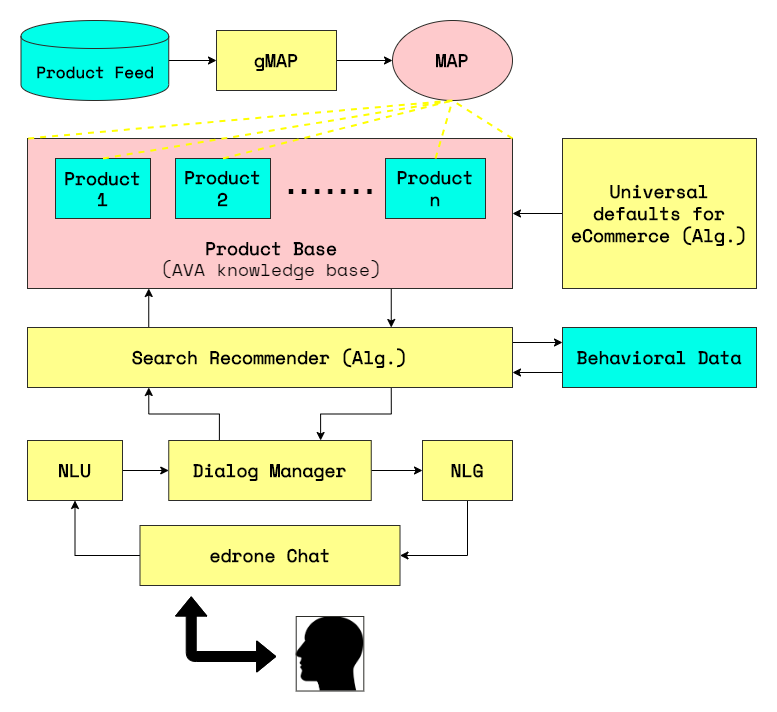Table of contents
Do you want to increase sales and build even better relationships with your customers?
The virtual shopping assistant provided by AVA will conduct natural, unscripted conversations — using natural language, with all colloquialism and meaning understandable only by humans — with eCommerce customers.
AVA is dedicated to eCommerce and all the conversations its customer care department is engaged in — i.e. products (characteristics, prices, specifications, etc.). Simple questions, like “product availability”, or terms, such as “returns”, are also important; however, handling such queries is relatively easy and is not a challenge in itself. The assistant must handle the product knowledge as a human being would do to ensure a shopping experience similar to that we can find at physical stores.
To organize all of this knowledge is one thing. Therefore, people ask mostly about things that are not listed in the product description; to extract it from the descriptions, as well as from past and future conversations, are part of the deal.
R&D Challenges, Scope, Milestones
Besides talking about description or conversation with customers, AVA is meant to be a commercial product. What is even more important: it will be a product sold in the B2B model to online shops of any size.
Running an eCommerce business requires a lot of different specializations and practical experience. It is crucial to provide solutions that are easy to introduce and maintain. Therefore, we need to automate the process of “building” the assistant as much as possible, keeping in mind the quality of the end-product — operational Voice Assistant, specialized, and dedicated to a particular shop. So, AVA will be machine developing machines.
We will start by developing an algorithm responsible for creating a language model adapted to eCommerce, working on text corpus consisting of descriptions of products taken from various eCommerce businesses in various industries. It is the base for the next step: NLP algorithms, from which two are particularly interesting — they will be the core of the AVA platform.
gMAP & MAP
The most crucial aspect of the project is to adapt the platform to various shops and data structures we can find among them. For example, some eCommerce businesses work on highly structuralized data (consisting of a hierarchy of product categories); others don’t. Also, we need the characteristics of the product to be structuralized as well. We called this piece “MAP”: Map of Attributes describing Products.
MAP is the center of our assistant. It is a multidimensional vector space, organizing assistant’s knowledge about products. Every product is automatically placed in this space, creating a unique model for each shop separately.
The creation of such complex objects as MAP is time-consuming and requires technical knowledge. Simultaneously, as we mentioned above, eCommerce employees need easy-to-use, fast, and reliable solutions. For that, we are going to provide the “gMAP”: generator of MAPs.
It provides the maximum possible simplification of the work necessary to create the MAP by applying machine learning algorithms and graphical interface for manual MAP modifications (active learning).
Fuel for AVA
gMAP uses data from three different sources:
- edrone plugin tracks customers’ behavior and passes it to the edrone platform.
- eCommerce platform API is useful for fetching product data, but not all platforms provide its API.
- Product Feed is widely used in eCommerce as a universal product list, used for multiple purposes, especially marketing, advertising, and stock monitoring.
The Product Feed is the most comprehensive source of product knowledge. It contains the product name, description, photos, category name, producer, price, availability, shipment, and other valuable information. AVA will extract from conversations all pieces of information not included in the product descriptions — available via the edrone plugin (API).
AVA Architecture

Following Challenges
On AVA’s roadmap, there are milestones not included in the description above, also worthy of mention:
- Search-recommender — consists of algorithms responsible for matching products to customers’ requirements and asking additional questions if needed for effective product recommendation (also supported by collaborative filtering and affinity analysis).
- Algorithm prototype for handling universal, eCommerce-specific product attributes — in various eCommerce industries, the products have some universal characteristics with which they are described; i.e. “size” in the fashion industry is an excellent example of such characteristic.
- NLU module — capable of extracting the eCommerce clients’ key requirements.
Are you interested in joining us in this challenge?
NCRD has already granted us USD 2.5M. Join our team of experts – we are currently looking for:
Feel free to contact us via any preferred channel or apply via the landing page:
- dreamteam@edrone.me
- +48 510 044 120
Marcin Lewek
Marketing Manager
edrone
Digital marketer and copywriter experienced and specialized in AI, design, and digital marketing itself. Science, and holistic approach enthusiast, after-hours musician, and sometimes actor. LinkedIn
Do you want to increase sales and build even better relationships with your customers?